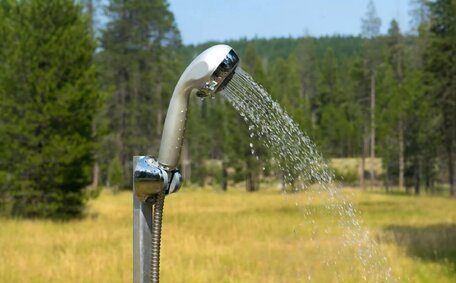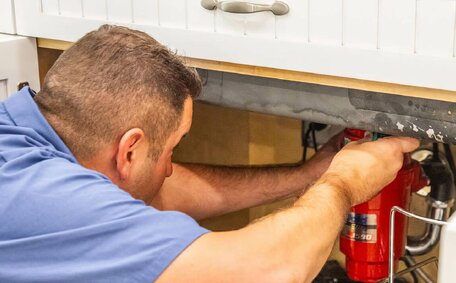Introduction: Construction Projects and Drain Issues
Construction projects can significantly affect your home’s pipes, often causing drain blockages. Homeowners in Penrith should be vigilant of site debris entering drains and causing clogs due to extensive construction.
The objective of this article is to educate readers on identifying, preventing, and clearing drain blockages specifically caused by construction debris. We will discuss how debris commonly enters your drains during construction and how it can obstruct water flow.
Importantly, we offer practical solutions to assist in keeping your drains flowing smoothly.
Preventing debris from entering sink and shower drains necessitates a coordinated effort and conscientious maintenance by all project participants. Our guidelines can prevent drain blockages and circumvent costly plumbing repairs.
We’ll identify signs of common clogs, like hair and soap scum, and provide drain maintenance tips to detect issues early and understand when to seek professional help. Whether you’re undertaking renovations yourself or developers are transforming neighbourhoods nearby, it’s vital to protect the plumbing system into your home from construction rubble.
Common Causes of Blocked Drains in New Builds
New homes’ drains may clog from construction debris entering the plumbing system. Listed are items commonly washed down drains, affecting your water flow in new builds:
- Concrete residue - Bits of concrete can easily be carried down as you use sink and drain channels during the construction process.
- Drywall joint compound - Joint compound used for drywall can contain gritty materials that make their way into drain pipes can contribute to slow drainage.
- Paints and solvents - Oil-based paints and solvents can solidify in drains and pipes, leading to blockages.
- Tiles and grout - Excess bits of tile, thinset, and grout can find their way down sink and drain passages.
- Wood shavings - Sawdust from woodworking can accumulate in drain channels, contributing to clogs.
- Plaster - Residue from plastering drywall can build up inside your drain pipes.
Beyond construction debris, everyday items like floss, hair, and soap scum can also lead to blocked or slow-draining pipes. Calling a professional plumber to hydro jet or clean out all drains after the completion of major construction is also highly recommended to prevent future problems.
Utilise drain catchers and screens during renovations to prevent sink blockages.
Signs There’s a Blockage in Your New Home
Certain signs can indicate potential blockages in your new home’s drains, such as: Identifying these signs blocked drain can exhibit is crucial to prevent severe plumbing issues water can cause down the line.
Some most common signs of plumbing blockages accumulated over time include:
- Water backing up through your sinks, showers, or bathtubs
- Toilets flushing slowly or not completely
- Gurgling sounds coming your way from drains
- Sinks draining slowly
- Bad smells coming from drains
- Presence of water around floor drains
Regular checks for correct water drainage in kitchen sinks, bathrooms, and laundry areas can also help catch blockages early. Sluggish taps or strange noises might signify pipe problems. This likely indicates debris accumulation within the main sewer line.
Do not ignore signs of blockage, which indicate a need for professional assistance rather than assuming the drain will clear on its own. Construction debris combined with daily grime can quickly congest the drain of your plumbing system. Take action at the first sign of a clogged drain to ensure your drains don’t become blocked, preventing major damage to your property.
Preventing Blockages During and After Construction
To prevent blocked drains, coordination between homeowners and contractors is essential. Here are some practical tips to prevent drains common blockages during construction:
- Install drain screens on all sinks, tubs, and floor drains to prevent particle entry and blockages.
- Regular drain inspections can prevent blockages after each construction phase
- Ensure proper cleanup and disposal of construction materials
- Dispose of paints, solvents, grouts, and similar materials that could block drains and are not easily biodegradable in separate containers
- Consider professional drain cleaning after major renovations
- Educate all workers on proper plumbing usage to prevent negligence
- Follow all building codes and council regulations regarding drainage
Homeowners should consistently care for drains even after construction ends. Monitor drainage, avoid disposing of food and grease down drains, and schedule yearly drain cleanings. Establishing clear responsibilities regarding drainage maintenance in rental agreements is also recommended.
With some diligence during construction projects and ongoing care for your drainage system, costly blockages can be avoided. Don’t hesitate to contact when a plumber can address any signs of congestion in your plumbing system.
Clearing Blockages Caused by Construction Debris
If you notice signs of a blocked drain your house is experiencing due to construction debris, there are some DIY methods you can try before calling your local professional:
- Try a soda vinegar mix - Combine baking soda and vinegar, pour it down the drain, and wait for the fizzing action to help dislodge the clog.
- Try boiling water and baking soda - Heat a large pot until the water is boiling, and pour down the drain, followed by 1/2 cup of baking soda. Let it sit for 15 minutes.
- Use a wire coat hanger - Straighten out the hanger and bend a small hook on one end to try and fish out debris.
Drain issues from construction materials may cause severe blockages. It’s best to call professional help right away, who can use specialised tools to tackle the common cause of clogs such as tiles, concrete, joint compound or other building rubble.
Professional plumbers have the tools, like hydro jets, to fix tough clogs in your drain pipes:
- Hydro jetting to blast debris and water down through pipes effectively
- Drain augers and drain snake tools to break up and grab foreign objects
- CCTV drain camera inspections to locate embedded materials
Trying to dismantle severe construction debris blockages yourself can damage your plumbing and delay repairs. Contact an expert Penrith plumber for urgent assistance with clearing blocked drains.
When to Call a Professional Plumber
It’s crucial to call a professional Penrith plumber right away if you notice any of the following warning signs of severe blockages in your pipes:
- Water is backing up in multiple fixtures like sinks, showers, tubs inside the pipes your home, making its way down slowly
- All drains in your home are draining very slowly
- You have made multiple attempts to clear debris with home remedies but the blockage persists
- You can distinctly hear gurgling sounds coming from the main sewer drain
- An extremely foul sewage odour is coming from your drains
- You see signs of water leaks or moisture damage around floor drains
Our licenced Penrith plumbers have the high pressure equipment and expertise needed to clear blocked drains, including hair soap scum, making it time to call professionals when DIY efforts can do little to combat. We can hydro jet your blocked drain, capture images with drain cameras, and fully restore functionality.
Don’t hesitate to email jobs@penrithplumbingservices.com.au or call 1300 349 338 if you encounter drain issues requiring urgent assistance. We provide 24/7 emergency plumbing services to rapidly resolve your blocked drain and prevent costly water damage in homes across Penrith.
Responsibility for Drain Issues in New Builds
When comes to blockages and drainage issues in newly constructed homes, determining responsibility can get complicated. In general:
- Tenants usually bear responsibility for clogs from hair, toilet paper, or improperly flushed items. Landlords are generally responsible for resolving structural issues like burst pipes or tree root intrusions.
- In owner-occupied homes, the property owner bears responsibility for all plumbing repairs and maintenance.
- Builders are required to fix defects like improper drainage under warranty.
Accountability can vary based on factors like location and contract terms. Homeowners and property managers should review contracts to understand their obligations. Seek legal counsel if unsure.
At Penrith Plumbing, we aim to quickly solve any drain issues regardless of cause. Our expert technicians can jet, snake, and camera inspect the pipes in your home to figure out the exact locations of blockages. We’ll restore flow and functionality to get the pipes in your home running smoothly again.
Contact us for any issues with blocked drains, slow drainage, sewer odours, or moisture damage. We have the tools and know-how to diagnose issues and prevent future problems.
Working with Builders and Property Managers
Clear and functional drains in new constructions depend on effective collaboration among homeowners, property managers, and builders. Preventative measures like using drain screens and proper debris cleanup should be coordinated at all project stages. Establishing clear maintenance responsibilities and open communication about drainage issues ensures swift resolution of problems.
Builders should instruct homeowners on their plumbing systems and emphasise contacting professionals promptly should blockages occur. For rental properties, landlords must clarify drain care responsibilities between themselves and tenants in all agreements. Being proactive is vital - early issue detection and professional servicing prevents major pipe damage and flooding.
At Penrith Plumbing, we offer comprehensive drain services to customers across Penrith, no matter the drainage problem source. Our expert hydro jetting, pipe inspections and clog removal capabilities make us the ideal specialists for new home construction projects in the area. Contact us for help in maintaining your plumbing.






